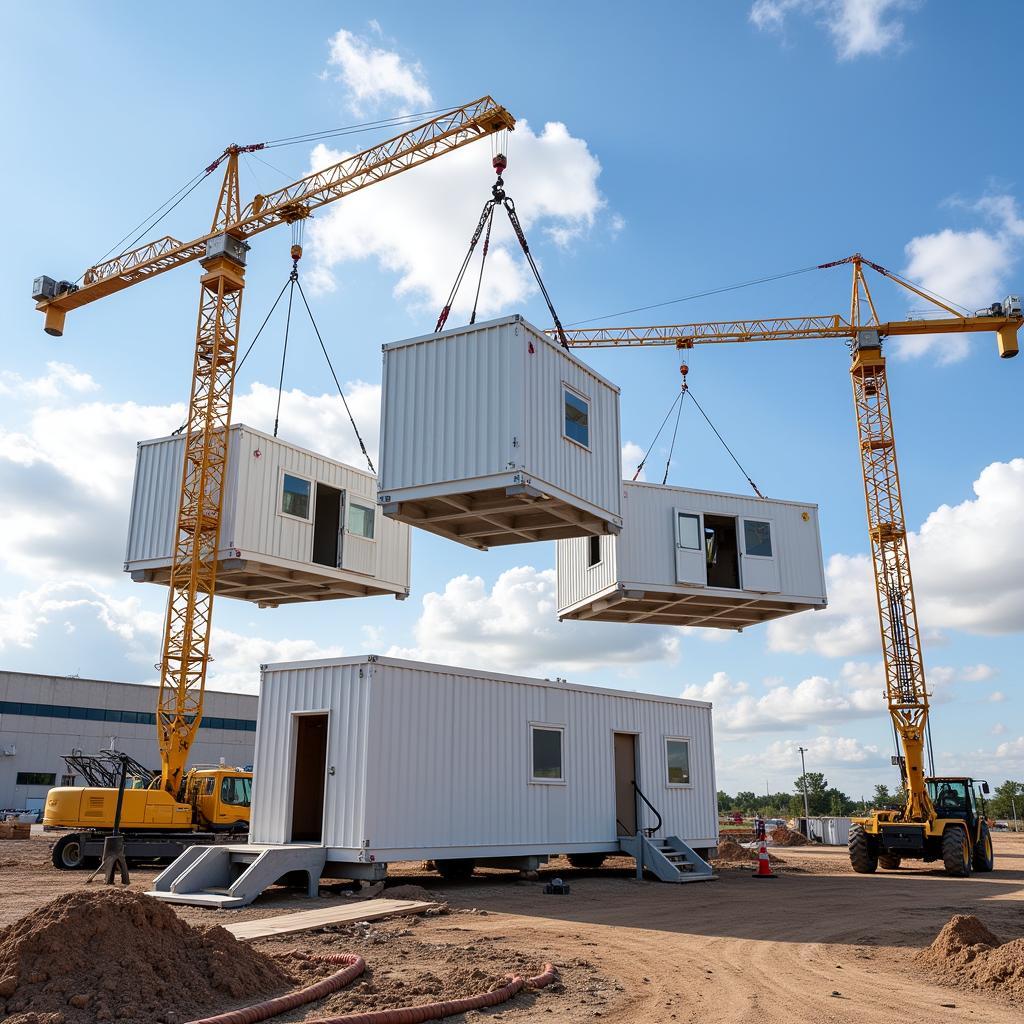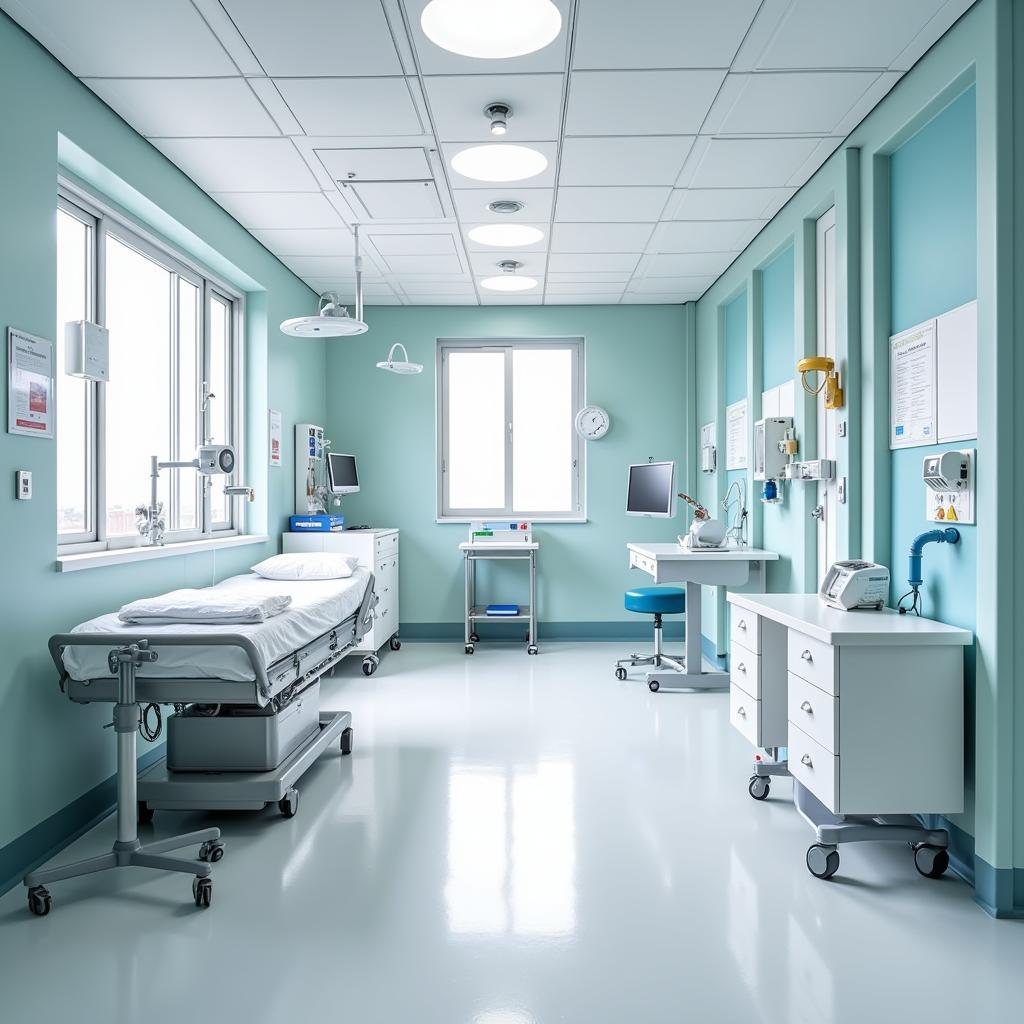Modular Hospitals, often called “hospitals of the future,” are revolutionizing healthcare infrastructure by offering a flexible and efficient alternative to traditional construction. Unlike conventional hospitals built brick by brick, modular hospitals are composed of prefabricated units or modules, constructed off-site in a controlled factory setting. These modules are then transported and assembled on location, significantly reducing construction time and disruption.
 Modular Hospital Construction in Progress
Modular Hospital Construction in Progress
Advantages of Choosing a Modular Hospital Design
The benefits of adopting a modular approach extend beyond speed and efficiency.
Enhanced Flexibility and Scalability
Modular hospitals excel in adaptability. Need to expand your facility to accommodate growing demands? Simply add more modules. This scalability ensures your hospital can readily adjust to evolving healthcare needs and population shifts.
Superior Quality and Safety Standards
Don’t mistake prefabrication for compromise. Modules are manufactured in state-of-the-art facilities with strict quality control measures, ensuring precision engineering and adherence to the highest safety standards.
Sustainability at its Core
Modular construction minimizes waste and site disturbance, promoting environmentally friendly practices. The controlled factory setting allows for better material management and reduced emissions, contributing to a greener footprint.
 Modern and Advanced Interior of a Modular Hospital Unit
Modern and Advanced Interior of a Modular Hospital Unit
Addressing Common Concerns About Modular Hospitals
Despite the numerous advantages, some misconceptions about modular hospitals persist. Let’s debunk some common myths:
Are Modular Hospitals as Durable as Traditional Hospitals?
Absolutely. Modules are built to withstand the test of time, using robust materials and adhering to rigorous building codes. They are designed for longevity and can endure diverse climatic conditions.
Is the Design and Functionality of Modular Hospitals Limited?
Not at all. Modular hospitals offer a wide array of design options and functionalities. From specialized operating rooms to advanced imaging suites, these facilities can be customized to meet the specific needs of any medical specialty.
“The beauty of modular design lies in its capacity to cater to unique requirements,” says Dr. Emily Carter, a leading healthcare architect. “We can tailor each module to accommodate specific equipment, workflows, and patient needs, creating a truly patient-centered environment.”
 State-of-the-Art Operating Room in a Modular Hospital
State-of-the-Art Operating Room in a Modular Hospital
The Future of Healthcare Infrastructure
Modular hospitals are not just a trend; they represent a paradigm shift in healthcare construction. Their adaptability, efficiency, and commitment to quality position them as the ideal solution for meeting the evolving demands of the healthcare landscape. By embracing this innovative approach, we pave the way for a future where accessible, high-quality healthcare is within everyone’s reach.
Frequently Asked Questions about Modular Hospitals
1. How long does it take to build a modular hospital?
Modular construction significantly reduces the construction timeline compared to traditional methods. Depending on the size and complexity, a modular hospital can be operational in a matter of months.
2. Can modular hospitals be expanded or reconfigured in the future?
Yes, one of the key advantages of modular hospitals is their flexibility. Modules can be easily added, removed, or reconfigured to accommodate future growth or changing needs.
3. Are modular hospitals as safe and durable as traditionally built hospitals?
Absolutely. Modules are manufactured in controlled factory environments with strict quality control measures. They adhere to the same building codes and safety standards as traditional hospitals.
4. What types of medical facilities can be built using modular construction?
Modular construction can be used to build a wide range of healthcare facilities, including hospitals, clinics, operating rooms, laboratories, imaging centers, and more.
5. How do the costs of modular hospitals compare to traditional construction?
Modular hospitals often have lower construction costs due to efficient manufacturing processes, reduced labor costs, and faster completion times.
For any inquiries or assistance, please contact us at Phone Number: 02437655121, Email: [email protected] or visit us at 298 Cau Dien Street, Minh Khai, Bac Tu Liem, Hanoi, Vietnam. Our dedicated customer support team is available 24/7 to assist you.